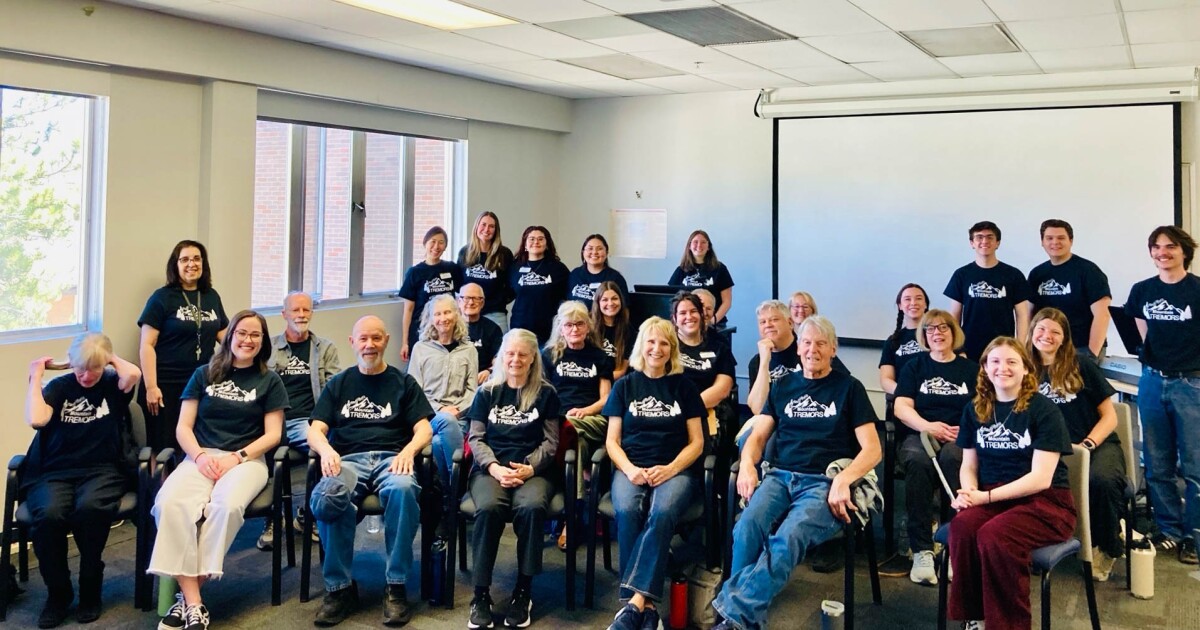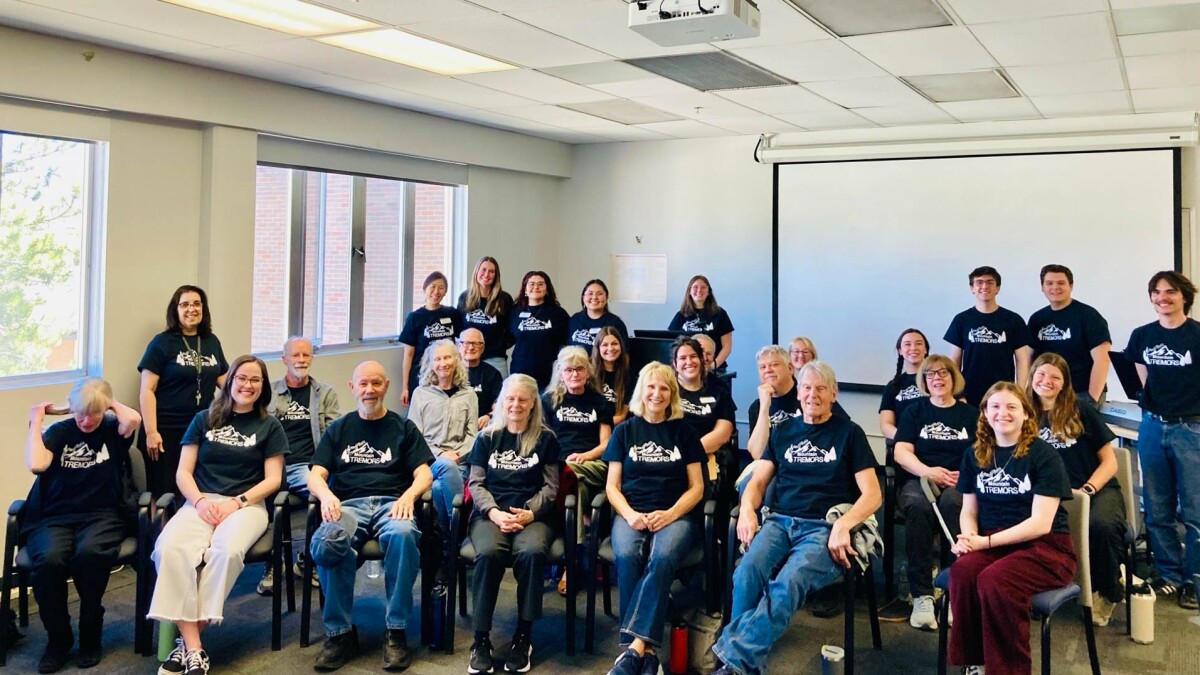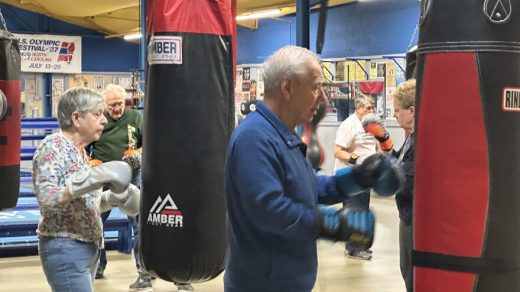
A choir in Northern Arizona aims to help people suffering from Parkinson’s Disease and other neurological impairments — both physically and mentally.
The Mountain Tremors Choir started nearly a decade ago, and other than taking a small break during COVID, has been singing ever since.
Fé Murray, an associate clinical professor at NAU in the Communication Sciences and Disorders Department, was handed the assignment of putting the choir together when she started at the university, after some community members said they knew of similar choirs elsewhere, and asked if there could be one in Flagstaff.
Murray joined The Show to discuss what it was like in the early years, trying to recruit members to come sing and be a part of this.
Full conversation
FÉ MURRAY: Yeah, so we had three original members that were really staunch supporters of the choir. And they’re the ones that began, and they would call their friends, and we would go knock on doors. We went to doctors’ offices and such.
And initially we were quite small. We had maybe a couple of students who volunteered.
We had maybe a director and then the three main members, and that was it. And, slowly we began to grow. After a while, I determined that maybe we should open it up to other neurological impairments.
And so we did. We opened it for anyone who felt that they wanted to strengthen their voice for whatever reason. We didn’t really want to just limit it to Parkinson’s disease. And we also invited their caregivers, family and anyone who they wanted to bring with, so that way they didn’t feel quite as alone.
MARK BRODIE: Did you find that people were excited to join? Did you kind of have to draw them out? I just wonder, like if you’re going through some of these diseases, yes, maybe you want to strengthen your voice, but you maybe are not so excited about doing it in maybe such a public setting.
MURRAY: People sometimes initially they’ll say, “Well, I, I’m not a good singer” or “I can’t sing in tune” or ‘Don’t expect much from me,” that sort of thing. So they come in already apologetic about their singing.
And that doesn’t last very long because usually, you know, we try to make it comfortable. So this is not a professional choir. You’re just expected to just join. Just pretend like you’re in the shower at home — keep your clothes on, but pretend you’re in the shower at home.
And so once they see that, it’s fun and we’re just singing, there’s no expectation, they seem to be relaxed, and they might invite a friend. We just try to make it as informal as possible and as enjoyable as possible. And people like the idea of getting out of the house and doing something fun.
BRODIE: There’s been a lot of talk, obviously, about how being in a choir, the benefits of music, the benefits of singing for people with these kinds of ailments. What is the benefit or what are the benefits to people with Parkinson’s or other neurological impairments of being in a group like this and physically singing?
MURRAY: Many times these neurological impairments do affect the voice in many ways. And also your wellbeing. And so usually people with, with Parkinson’s, for example, have reduced volume. They speak more softly or quietly. They tend to have a more of a monotone voice, and often their speech becomes slurred. Even changes in the rate of speech — they might speak more slowly. Or sometimes you have like this rush of speech.
It’s just very difficult. They have difficulty with coordination, and also breath support issues. And all of these things can really be addressed through music.
And so when we’re singing, we’re really focused on that, improving that voice volume. The singing encourages people to project their voice, which counteracts that soft, the hypophonia or the soft speech that we often hear in Parkinson’s.
We also work a lot on breath support. You know, singing helps strengthen those respiratory muscles, and it really improves that support and that discoordination that people sometimes have with neurological impairments. This exercise of learning how to control your breath actually enhances their overall speech.
Also we’re talking about the muscle discoordination that happens with many of these neurological impairments. The act of singing actually engages various muscle groups, which can carry over to speech and other movements. So, we work a lot on over-enunciating and practicing making your voice, your speech very clear.
Some of the other things that are unintended consequences are the emotional benefits of singing.
BRODIE: I wanted to ask you about that because I’m curious about sort of the psychological, the social potential benefits of being in a group like this, in addition to the physical ones, as you mentioned. It sounds like in some cases it’s a very safe space for the choir members to come because … everybody’s got some ailment they’re dealing with.
And it sounds like it almost kind of turns into a bit of a support group, except singing instead of going around talking about what, what you’re dealing with.
MURRAY: We really don’t do a lot of talking about what we’re dealing with. People come, and everybody’s got their own thing going on. And even our students, because we do have a lot of students who come in and participate in the choir as well. And we just find that singing brings everybody together.
When, when you’re singing, you’re evoking memories of the past, and it just it has that emotional connection to a time when you were maybe healthy, the peak of your life kind of thing. And so that in itself can also bring you closer to other people who are of similar age. “Oh, yeah, I remember dancing to this song at my senior prom.”
And so it makes for community that maybe other activities that are more active wouldn’t really — it’s a different kind of engagement, I guess, is what I’m trying to say.
BRODIE: Does this choir ever put on performances?
MURRAY: So it’s funny you should ask that. Every semester, we have usually like the end of the semester performance. I mean, we’ve been practicing new songs. There has to be some kind of a performance. So we do put on like a little mini show.
And because of memory issues and sometimes tremors that happen with these impairments, we do it kind of karaoke style so everyone can see the words. And so it’s more like a sing-along.
But this year we’ve been asked to sing twice outside of that performance. So we’re really excited. We’re going to be going to a rehabilitation facility and singing to some folks there. They can’t really get out and join our choir. And we’re hoping to make it a nice big sing-along.
And then our own college, the College of Health and Human Services here, has asked us to do some sort of holiday caroling during their annual celebration at the end of the semester.
BRODIE: All right, so when you are planning for a show, what are the reliable hits that. Well, that will bring the house down?
MURRAY: The reliable hits. Well, the one song that we have sung over and over again over the years has been “Take It Easy” by the Eagles. And we always replace Winslow, Arizona, with Flagstaff, Arizona.
BRODIE: Naturally. It’s an Arizona favorite.
MURRAY: It’s an Arizona favorite. So we sing that. This time we’re doing “New York, New York” by Frank Sinatra. And “Sweet Caroline” is always good because of course, everybody comes around with, you know, “ba ba ba,” “So good! So good!” You have a little participation.
We’ve done some Beatles. “I Want to Hold Your Hand.” Beatles is always a favorite, but lately it’s been Frank Sinatra. I think we did “Fly Me to the Moon” last semester. Sometimes we go back. At the very beginning, we were in the ’40s, and now we’re looking like we’re doing more ’70s type things. So it depends on the age of the group.
And Journey always brings — Journey, “Don’t Stop Believin’.” The other one that’s been a big one for us besides “Take it Easy” is “Lean on Me” by Bill Withers. It’s emotional, and it’s a song that’s a favorite of our group. I don’t think we’re doing it this time around.
BRODIE: That’s such an eclectic song list.
MURRAY: Yeah. It is very eclectic. And sometimes we have to convince them. Sometimes it’s like, “OK, the director gets a say.” And sometimes we have to have them practice it a few times and get them to like it.
KJZZ’s The Show transcripts are created on deadline. This text is edited for length and clarity, and may not be in its final form. The authoritative record of KJZZ’s programming is the audio record.



